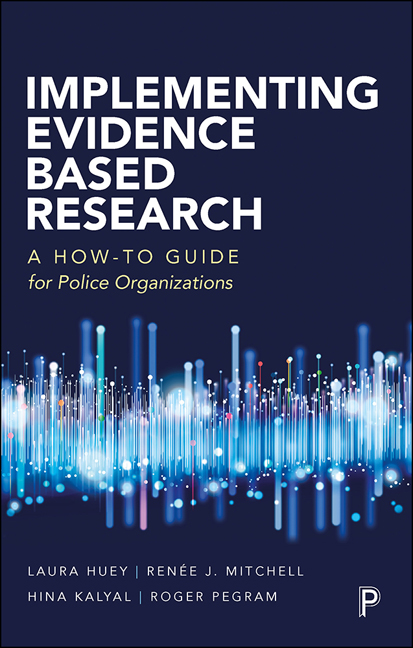Book contents
- Frontmatter
- Contents
- List of tables and figures
- Acknowledgments
- Introduction
- 1 Implementing evidence-based policing
- 2 Situating evidence-based policing
- 3 Understanding research
- 4 The individual approach
- 5 The smaller agency
- 6 The mid-sized agency
- 7 The larger agency
- 8 Generating sustainability
- 9 Resources for evidence-based practices
- Endnotes
- References
- Index
4 - The individual approach
Published online by Cambridge University Press: 05 January 2022
- Frontmatter
- Contents
- List of tables and figures
- Acknowledgments
- Introduction
- 1 Implementing evidence-based policing
- 2 Situating evidence-based policing
- 3 Understanding research
- 4 The individual approach
- 5 The smaller agency
- 6 The mid-sized agency
- 7 The larger agency
- 8 Generating sustainability
- 9 Resources for evidence-based practices
- Endnotes
- References
- Index
Summary
In the earliest days of evidence-based policing (EBP), it was an approach understood and adopted by only a handful of people, arguably a few academics and police leaders in the UK and USA. Today, much has changed. We are increasingly seeing its adoption by a range of policing practitioners and scholars across the globe. Among the former are crime analysts (Drawve et al, 2017; Finnegan et al, 2018; Mark et al, 2019), frontline police officers (Williams and Coupe, 2017), and police leaders (Martin, 2018; Murray, 2018), who are variously developing, executing, commissioning, and/or using research to inform policies and practices. Some of this work is beginning to occur at the agency level (most notably in the UK); however, EBP does not require a whole-agency approach, and many practitioners work on individual or one-off projects on their own, hoping to build internal and external support for evidence-based practices through success. Others adopt EBP simply because it suits their personal ethos, providing them with individual opportunities to solve problems within their work environment, and creating new opportunities to stimulate learning and personal growth.
Introducing a new way of critically examining policy and practice is uncomfortable for most professions. In policing, an occupational culture with a history of conservativism, traditionalism, and concern for rank and hierarchy (Skolnick, 1966; Loftus, 2010; Paoline, 2014), attempting to advance a scientific approach to the policing profession on your own can seem daunting (see, for example, Reuss-Ianni, 1983; Chan, 1997). That said, there are some excellent resources on implementing small-or large-scale organizational changes that can help you to navigate these murky waters (see, for example, Grant, 2016; Kaplan, 2017). And in this chapter, we provide further assistance by including some concrete ideas from educational sources for getting started or continuing your journey to learning about and implementing EBP, as well as how to effectively network with researchers and other EBP practitioners.
Starting from scratch
Nowadays, when people want to know more about a topic, they often turn to the internet. While there are many advantages to ‘surfing’ for knowledge, this method is not without its limitations. Anyone in the discipline of Medicine will tell you, for example, that the field is rife with jokes about Doctor Google and patients using online websites to diagnose themselves with rare diseases.
- Type
- Chapter
- Information
- Implementing Evidence Based ResearchA How-to Guide for Police Organizations, pp. 61 - 82Publisher: Bristol University PressPrint publication year: 2021



